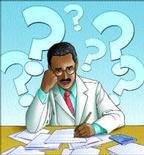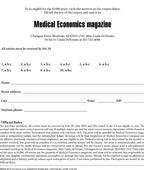Article
Take this tax quiz. You might win $2,000!
Finding ways to cut Uncle Sam's take isn't the only reason to see how tax-savvy you are.
Your 1040
Take this tax quiz. You might win $2,000!
Finding ways to cut Uncle Sam's take isn't the only reason to see how tax-savvy you are.
By Doreen Mangan, Senior Editor

The tax know-how you've picked up over the years has helped cut your debt to Uncle Sam. Now, this expertise could pay off in another way: Send us your answers to the questions that follow, and you may win our contest.
We'll award a prize to the entrant with the most correct responsesor, if multiple readers tie, we'll draw one winner. If you're that person, in the spirit of the millennium, we'll write you a check for $2,000. That should be enough to cover your tax-preparation costsor a party or vacation sufficient to make you forget all about your taxes.
The questions concern a fictitious couple, FP Jill Shield, a solo practitioner, and her schoolteacher husband, John. (Hint: You'll find answers to all the questions in this issue's tax articles.)
Good luck. The correct answers and the name of the winner will appear in our March 20 issue.
1. After the Shields moved last year, they borrowed $18,000 using an ordinary, unsecured bank line of credit. They used the money to put in a swimming pool at their new home, and they figure the interest will be a nifty tax deduction. Are they right?
a) Yes. This is similar to a home equity loan, and that interest is deductible.
b) Wrong. This kind of interest isn't deductible.
c) Wrong. A line of credit must exceed $20,000 to be deductible. Furthermore, the money can be used only for needed renovations, not something frivolous like a swimming pool.
2. Jill Shield drives a car that's owned by her professional corporation. Eighty percent of the car's use is work-related, so she intends to deduct depreciation and other costs on her personal return. Is she right or wrong?
a) Right. It's a legitimate work-related expense.
b) Wrong. She can only deduct mileage.
c) Wrong. The corporation gets the deductions.
3. Although John Shield began a sideline freelance photography business in 1998, he has yet to turn a profit. He invested a lot in camera and darkroom equipment, as well as in advertising. The couple intends to claim his losses. Is this risky?
a) Not if they take certain precautions.
b) Yes. Until he turns a profit, he can write off only half his expenses.
c) It's not a good idea. The IRS says you have to turn a profit in at least two years out of five to claim losses. John Shield's business is too young.
4. Last summer, Jill Shield brought her husband along on a CME trip to Vancouver. They didn't add any vacation time, although John accompanied his wife when she drove, afterward, to a two-day conference outside Vancouver. Jill intends to deduct the rental car expenses and the full cost of the hotel room, for which she paid the double-occupancy rate. She won't claim the cost of her husband's meals. Is she correct?
a) Yes. She would have used the room and car even if her husband hadn't accompanied her, so those expenses are fully deductible.
b) No. She can deduct all the expenses, because she was attending social events at the conference and was entitled to bring her husband with her.
c) No. She can deduct the full cost of the rental car, but only the single-occupancy rate for the room cost.
5. John Shield inherited stock worth $50,000 last year. Eager to try his hand at trading, he sold his uncle's boring blue chips at a $10,000 gain and put the money into high-tech stocks. The couple is facing a tax bill on what amount?
a) $60,000. He should have spread the sale over several years, to avoid such a huge tax bite.
b) $10,000. He pays only on his gain.
c) Zero. He owes no tax, because it was an inheritance.
6. John was also the beneficiary of his uncle's IRA. The uncle made deductible contributions for many years. No taxes are due on this inheritance. Correct?
a) Yes, as long as the entire estate is less than $650,000.
b) Sure, because tax-free income is the whole point of IRAs.
c) No. Since the money wasn't taxed going in, it's taxed coming out.
7. After driving to her office one morning, Jill Shield bumped her car into a gatepost in her practice's parking lot and sustained $650 worth of damage. She doesn't want to file an insurance claim, but she intends to write off the entire repair expense on her tax return, since she uses the car for business. Correct?
a) Good idea. The more insurance claims you file, the higher your premiums.
b) No. The IRS won't accept writeoffs for expenses that are covered by insurance, whether or not a claim is filed.
c) No. She can only write off the percentage of the repair that's proportional to her business use of the car.
8. The custodial account the Shields opened when their daughter was born has grown to a tidy sum of $18,000. Jenny is now 11, so her parents assume that all of the account's earnings will be taxed at her rate of 15 percent. Correct?
a) That's right. The IRS goes easy on kids' money.
b) No. After a standard deduction of $700, only the next $700 of investment income is taxed at the kids' rate.
c) No. The first $500 of income is tax-free; the balance is taxed at the kids' rate.
9. The Shields attended fund-raising dinners and concerts for charities during the year. They intend to deduct their donations, minus the value of the dinners and concerts. Are they splitting hairs?
a) No, that's what the IRS requires.
b) Yes. They can deduct the full amount they spent, though they'd be limited to $250 for donations they can't back up with receipts.
c) Yes. The entertainment part of such events is deductible. It's for charity, after all.
10. When they sold their old house in May 1999, the Shields made a $50,000 profit. How can they avoid paying tax on it?
a) They can't. Tax is due on their tax return for 1999.
b) They can't. But by rolling over those gains into the cost of a more expensive house, they've deferred the tax bill until they sell the new home.
c) No tax is due.

. Take this tax quiz. You might win $2,000!. Medical Economics 2000;3:236.





